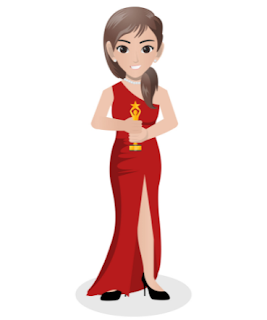 I have never been a big fan of female-specific variations on
common words. One of the dumbest words in the English language has got to be
aviatrix, which is a female aviator. No. Just no.
I have never been a big fan of female-specific variations on
common words. One of the dumbest words in the English language has got to be
aviatrix, which is a female aviator. No. Just no.
But there are some I don’t mind, some where the gendering of
the word gives an additional qualitative meaning to it. For some reason, I
think of “actress” as one of those words.
It’s not that there’s a huge difference in the day-to-day
job description for men and women who make their living acting. There’s usually
a gender performative aspect to their job, but not always, as men sometimes
play women, women sometimes play men, and both sometimes play transgender
people. But I do think there is something of historical interest in the term “actress,”
as I assume it was once created to immediately clarify that it’s a woman doing
the job rather than a man, which had historically been the case regardless of
the gender of the character being portrayed.
“What makes that different than aviatrix, Vance?”
I don’t know. Just shut up.
It could just be that the history of giving awards to people
who act has made the term useful. It’s much easier to say that Meryl Streep was
nominated for “best actress,” for example, than “best female actor.”
Whether all actors should be judged in a single category is a discussion for
another time.
Anyway, I find myself bristling a little whenever someone is
too particular about calling an actress an actor. I don’t have a problem with
calling a woman an actor, but I have a problem with the viewpoint that it is in
some way demeaning to use the term “actress.” It’s so nothing like aviatrix,
which is a blatantly complicated change to make. Actress flows naturally and
nicely. It is entrenched via common usage.
I’m to my point now.
I know I’ve been picking on Slate podcaster Dana Stevens a
bit lately, which is not my intent, as I’m a big fan and actually got my
picture taken with her when The Slate
Culture Gabfest toured Australia. And in this case, it’s something anyone
could have said, and seems to be illustrative of a larger point.
I was listening to an episode of the Culture Gabfest yesterday that actually posted back in February. I
dug it back out because I had skipped their spoiler-filled discussion of Abducted in Plain Sight, which I
obviously have now seen as I wrote about it yesterday on this blog. I figured,
having aired some fairly strong opinions about the movie, I thought I’d see how
their opinions matched up with mine.
In the segment at the end of the show where they endorse
something they are enjoying in the pop culture world, Dana endorsed a YouTube
series in which a woman who functions as a speech coach critiques acting
performances for how well they nailed the accents. In the course of this endorsement,
Dana said something like this: “The series is run by this actress who gets a
lot of work, and it interested me because my daughter aspires to be an actor.”
As you can see, Dana used both the terms “actress” and “actor”
in the very same breath, and both when referring to a woman: this professional
running this series, and her daughter. It was likely just a slip of the tongue
and not something she intended, but that may make it all the more telling.
If we are to parse what Dana said, it suggests that “actress”
is what you call a woman when she already has a job, and that job is acting.
However, it’s not something you aspire to. You aspire to be an actor.
If these are the subconscious meanings some people are
carrying around with them, I can see why female thespians find it a bit demeaning to be
referred to as an actress, whether they “should” or not.
It could also be that Dana recognized she used a term she
didn’t intend to use and corrected herself mid-thought, something she is
particularly good at doing, as her thoughts on the podcast tend to be extremely
well articulated yet also seem spontaneous. If I asked Dana whether she
preferred the term actor or actress, she’d probably say the former. Or it could
be that she unconsciously observes a distinction between someone she doesn’t
know, who can get the more “dismissive” term actress, and her own daughter, who
deserves to complete equally in the world by virtue of a non-gender-specific
term.
But I think it’s also incorrect to assume that “actor” is
most commonly perceived as non-gender-specific. Most people, I would argue,
think of an actor as a man. Instead of striving for a certain gender equality,
then, the opposite result might be achieved in using the word “actor” for a
woman. It might make it look like that woman wants to be recognized via a bit
of male terminology, which makes it seem like she wants to be like a man,
rather than just being like herself.
I don’t know what any of this means, nor is it very likely
to change how I use the word. If I had a daughter and she was into acting, I’d
probably say she wants to be an actress.
However, if Dana Stevens’ daughter wants to be an actor, more
power to her.

1 comment:
The journey of an actress is one of passion, perseverance, and evolution. From being sidelined dm speacialist and objectified to becoming global influencers and cultural leaders, actresses have carved a space that is powerful and transformative.
Post a Comment